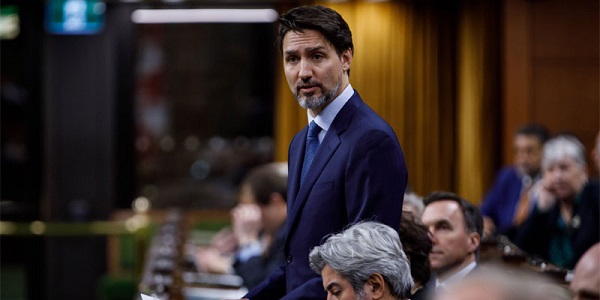Business
Trudeau’s new tax package gets almost everything wrong

From the Fraser Institute
Recently, Prime Minister Justin Trudeau announced several short-term initiatives related to tax policy. Most notably, the package includes a two-month GST holiday on certain items and a one-time $250 cheque that will be sent to all Canadians with incomes under $150,000.
Unfortunately, the Trudeau government’s package is a grab bag of bad ideas that will not do anything to get Canada out of the long-term growth rut in which our economy is mired. There are too many to list all in one place, but here are four of the biggest problems with Prime Minister Trudeau’s tax plan.
- It reduces the wrong taxes. When it comes to economic growth, not all taxes are created equal. Some cause far more economic harm per dollar of government revenue raised than others. The government’s package creates a holiday on the GST for some items (only for two months) which is a mistake given that the GST is one of the least economically harmful components of the tax mix. Canada’s recent growth record is abysmal, and boosting growth should be a primary goal of any changes to tax policy. A GST cut of any duration fails this test relative to other tax cuts.
- Temporary tax holidays shift consumption in time, they don’t boost growth. The government’s GST reduction is actually a short-term tax holiday on certain items that will last two months. There are decades worth of economic research showing that when governments create short-term tax breaks, they may change the timing of consumption, but they won’t contribute to actual economic growth. Shifting consumption from the future to the present won’t help get Canada out of the economic doldrums. This is particularly true of the Trudeau tax holiday since purchases that Canadians may have made after the two-month holiday period will simply be shifted forward to take advantage of the absence of the GST. As noted above, there are better taxes to cut than the GST, but no matter what taxes we are talking about permanent reductions are vastly superior to temporary tax cuts like short-term holidays.
- One-time tax rebates don’t improve economic incentives. Perhaps the worst element of the Trudeau government’s announcement was a plan to send $250 cheques to all Canadians earning under $150,000. One-time tax rebates are a terrible way to provide tax relief. When you cut income tax rates, you improve incentives for people to work and invest because they get to keep a larger share of their earnings. This helps the economy grow. One-time rebates that you get regardless of the economic choices you make has no similar effect. This means that the rebate with its $4.7 billion price tag won’t help Canada’s poor growth performance.
- It borrows from the future to give to the present. The federal government is currently running a large deficit. This raises the question of who will have to pay the $4.7 billion bill for the one-time payments announced today. The answer is that the government will have to borrow the money and therefore future taxpayers will have to either pay it off or service the extra debt indefinitely. The money the Trudeau government will send out won’t come out of thin air, it’ll have to be borrowed with the burden falling on future taxpayers.
The Trudeau government got one thing conceptually right, which is that there are advantages to reducing the tax burden on Canadians. Unfortunately, the policy package it has put forward to provide tax relief gets everything wrong. It reduces the wrong taxes, shifts taxes temporally rather than cutting them, does nothing to improve economic incentives, and burdens future taxpayers. With the holiday season around the corner, this attempt at a gift to Canadian taxpayers is the economic equivalent of a lump of coal in the stocking.
Authors:
Business
Carney’s budget spares tax status of Canadian churches, pro-life groups after backlash

From LifeSiteNews
Canadian pro-life charities and churches retain their tax-exempt status in the 2025-26 budget, a reversal attributed to public and political opposition to earlier proposals.
Canadian pro-life charities and churches will not lose their tax exemption under the Liberal Party’s newly presented fall budget despite earlier threats.
On November 4, Liberal Finance Minister François-Philippe Champagne presented the Canadian federal budget for Fiscal Year 2025-26 in the House of Commons that included no mention of stripping pro-life organizations and churches of their tax exemption.
“Campaign Life Coalition is breathing a sigh of relief that churches and pro-life organizations were not stripped of their charitable status in the (Mark) Carney Liberal budget released today,” Campaign Life Coalition (CLC) communications director Pete Baklinski said in a statement sent to LifeSiteNews.
As LifeSiteNews previously reported, before last Christmas, a proposal by the all-party Finance Committee suggested legislation that could strip pro-life pregnancy centers and religious groups of their charitable status.
The legislation would amend the Income Tax Act and Income Tax. Section 429 of the proposed legislation recommends the government “no longer provide charitable status to anti-abortion organizations.”
The bill, according to the finance department, would require “registered charities that provide services, advice, or information in respect of the prevention, preservation, or termination of pregnancy (i.e., destroying the unborn)” to disclose that they “do not provide specific services, including abortions or birth control.”
Similarly, Recommendation 430 aims to “amend the Income Tax Act to provide a definition of a charity which would remove the privileged status of ‘advancement of religion’ as a charitable purpose.”
Canadians quickly responded to the recommendations, warning that it would mean the end of many pro-life organizations and the vital work that they do to help mothers in need.
Likewise, Conservative MPs and clergy alike condemned the suggestion to tax churches that provide essential services to Canadians.
CLC national president Jeff Gunnarson commended Canadians for their pushback, attributing the victory to their strong opposition.
“This is a victory for religious freedom and for the Canadian values of helping the vulnerable, offering a compassionate hand, and being present to those in crisis,” he declared.
“The Liberal government was right to listen to ordinary citizens and faith leaders and ultimately reject these outrageous recommendations,” Gunnarson continued. “Thanks be to God, Canada lives to see another day without a dark cloud of persecution hanging over religious and pro-life organizations.”
“This victory belongs to the concerned citizens across Canada who took the time to sign a petition or write a letter to their MP or the Finance Minister,” he said. “This proves that when enough people speak out, good things can happen.”
Currently, the budget is under Parliamentary review, as Liberals lack sufficient votes to pass the legislation. Conservative Party leader Pierre Poilievre has declared that his party will not support the budget. The Bloc Québécois have also pledged opposition and the New Democratic Party (NDP) is considering supporting the budget.
Business
The Liberal budget is a massive FAILURE: Former Liberal Cabinet Member Dan McTeague

Prime Minister Mark Carney tabled his government’s long-overdue budget yesterday and took the same approach as his predecessor – spend, spend, spend.
Canada’s deficit is now a staggering $78 BILLION. To make matters worse, Carney doubled down on the industrial carbon tax.
Dan McTeague explains in his latest video.
-

 Business2 days ago
Business2 days agoTrump’s Tariffs Have Not Caused Economy To Collapse
-

 Daily Caller2 days ago
Daily Caller2 days agoTrump Reportedly Planning Ground Troops, Drone Strikes On Cartels In Mexico
-

 Alberta2 days ago
Alberta2 days agoAlberta government’s plan will improve access to MRIs and CT scans
-

 Brownstone Institute2 days ago
Brownstone Institute2 days agoBizarre Decisions about Nicotine Pouches Lead to the Wrong Products on Shelves
-

 International2 days ago
International2 days agoHours after Trump’s warning, Nigerian Christians massacred by Islamist gunmen
-

 Economy1 day ago
Economy1 day agoWelcome to the Energy Humanist Club! Bill Gates breaks the moral monopoly against fossil fuels
-

 Business2 days ago
Business2 days agoCarney government’s first budget should signal end to crippling ‘climate’ policies
-

 Business2 days ago
Business2 days agoNo Jobs Clause: Liberals Under Fire Over Stellantis Deal in Fiery Committee Showdown











